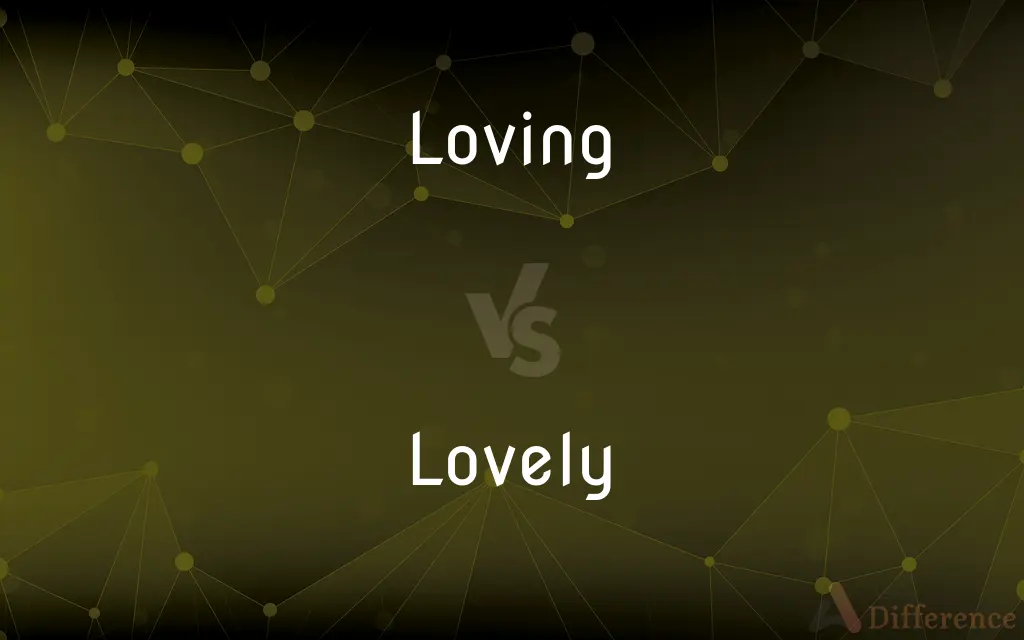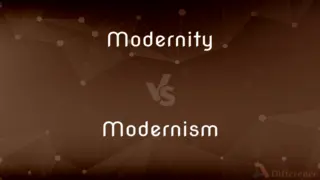Loving vs. Lovely — What's the Difference?
Edited by Tayyaba Rehman — By Fiza Rafique — Updated on April 26, 2024
"Loving" describes an affectionate and caring nature, while "lovely" refers to something delightful or beautiful.

Difference Between Loving and Lovely
Table of Contents
ADVERTISEMENT
Key Differences
"Loving" is an adjective used to describe someone who shows love and affection towards others, indicating a deep sense of care and empathy. On the other hand, "lovely" is often used to describe the appealing and attractive qualities of an object, person, or scene, focusing on aesthetic or emotional appeal.
Loving actions are characterized by warmth and kindness, usually reflecting a person's behavior or disposition. Whereas, something that is lovely is pleasing to the senses, often invoking feelings of joy and admiration.
Loving is about the emotional depth and genuine concern for the well-being of others, highlighting the relational aspect of individuals. In contrast, lovely tends to emphasize superficial or observable characteristics that are universally appealing.
While loving describes the quality of affection in relationships, such as in a loving family, lovely could describe anything that is visually or emotionally appealing, such as a lovely painting.
"Loving" can influence how relationships are formed and maintained, focusing on emotional interactions. On the other hand, "lovely" might be used more casually to express satisfaction or pleasure about situations or objects.
ADVERTISEMENT
Comparison Chart
Definition
Showing love and affection
Delightful, beautiful, or attractive
Focus
Emotional and caring interactions
Aesthetic or emotional appeal
Typical Use
Describing people's nature or actions
Describing things or views
Example Contexts
Loving mother, loving gesture
Lovely day, lovely smile
Outcome
Enhances relationships
Evokes pleasure or admiration
Compare with Definitions
Loving
Expressing love through actions.
They shared a loving embrace.
Lovely
Aesthetically pleasing.
She wore a lovely dress to the party.
Loving
Showing great care.
He gave his dog a loving home.
Lovely
Pleasing in general manner or appearance.
He has a lovely personality.
Loving
Kind-hearted or compassionate.
Her loving response to the crisis touched everyone.
Lovely
Evoking love by beauty or kindness.
Her lovely smile brightened the room.
Loving
Devoted or loyal.
His loving dedication to the project was admirable.
Lovely
Very beautiful or attractive
She looked lovely
Lovely views
Loving
Feeling or showing love or great care
A loving father
The cargo was described in loving detail
Lovely
An attractive woman or girl
A bevy of lovelies
Loving
Feeling love; affectionate.
Lovely
Beautiful especially in a pleasing or charming way.
Loving
Indicative of or exhibiting love.
Lovely
Enjoyable; delightful
Had a lovely weekend in the country.
Loving
The action of the verb to love.
Lovely
(Archaic) Inspiring love or affection.
Loving
Expressing a large amount of love to other people; affectionate.
His loving wife
Lovely
(Obsolete) Full of love; loving.
Loving
Present participle of love
Lovely
A beautiful person, especially a woman.
Loving
Affectionate.
The fairest and most loving wife in Greece.
Lovely
A lovely object.
Loving
Expressing love or kindness; as, loving words.
Lovely
Beautiful; charming; very pleasing in form, looks, tone, or manner.
It's a lovely day and the sun is shining.
The music box plays a lovely melody.
The castle garden enchants visitors with its lovely blooms.
Loving
Feeling or showing love and affection;
Loving parents
Loving glances
Lovely
Very nice, wonderful.
It would be lovely to have a little more money to spend.
Loving
Characterized by warmth and affection.
Her loving nature makes her a great friend.
Lovely
(obsolete) Inspiring love or friendship; amiable.
Lovely
(obsolete) Loving, filled with love.
Lovely
Worthy of praise.
Lovely
(informal) An attractive, lovely person, especially a (professional) beauty.
A calendar depicting young lovelies in bikinis
Lovely
Term of fond address.
Goodbye, my lovely.
Lovely
A lovely object.
Lovely
(informal) In a lovely fashion or manner; beautifully.
Lovely
Having such an appearance as excites, or is fitted to excite, love; beautiful; charming; very pleasing in form, looks, tone, or manner.
Not one so fair of face, of speech so lovely.
If I had such a tire, this face of mineWere full as lovely as is this of hers.
Lovely
Lovable; amiable; having qualities of any kind which excite, or are fitted to excite, love or friendship.
A most lovely gentlemanlike man.
Lovely
Loving; tender.
Many a lovely look on them he cast.
Lovely
Very pleasing; - applied loosely to almost anything which is not grand or merely pretty; as, a lovely view; a lovely valley; a lovely melody.
Indeed these fieldsAre lovely, lovelier not the Elysian lawns.
Lovely
In a manner to please, or to excite love.
Lovely
A very pretty girl who works as a photographer's model
Lovely
Appealing to the emotions as well as the eye
Lovely
Lovable especially in a childlike or naive way
Lovely
Delightful or charming.
They had a lovely time at the dinner.
Lovely
Attractive or beautiful.
What a lovely view from the balcony!
Common Curiosities
Can a person be both loving and lovely?
Yes, a person can be both loving (affectionate in nature) and lovely (charming or pleasing in appearance).
Is "loving" used exclusively for people?
Primarily, yes. "Loving" describes actions or qualities of people, though it can metaphorically apply to pets.
How does the context change the use of loving and lovely?
"Loving" focuses on personal qualities and relationships, whereas "lovely" can apply broadly to anything pleasing or charming.
Which is more subjective, loving or lovely?
"Lovely" can be more subjective as it largely depends on personal taste and perception.
Do loving and lovely have the same emotional impact?
Not necessarily; "loving" generally implies deeper emotional connections, while "lovely" might evoke a lighter, aesthetic pleasure.
What is the main difference between loving and lovely?
Loving pertains to showing affection and care, while lovely describes something that is delightful or beautiful.
What types of things are typically described as lovely?
Scenery, objects, days, or experiences that are particularly pleasing or beautiful are described as lovely.
Can "lovely" describe an attitude?
Yes, someone can have a lovely attitude, meaning it is pleasant and likable.
Can landscapes be described as loving?
Typically not; landscapes would more often be described as lovely due to their beauty.
Is the term "lovely" more versatile than "loving"?
Yes, "lovely" can be used more broadly across different subjects and contexts than "loving", which is more specific to emotional expressions.
Share Your Discovery

Previous Comparison
Modernity vs. Modernism
Next Comparison
Uncheatable vs. CheatAuthor Spotlight
Written by
Fiza RafiqueFiza Rafique is a skilled content writer at AskDifference.com, where she meticulously refines and enhances written pieces. Drawing from her vast editorial expertise, Fiza ensures clarity, accuracy, and precision in every article. Passionate about language, she continually seeks to elevate the quality of content for readers worldwide.
Edited by
Tayyaba RehmanTayyaba Rehman is a distinguished writer, currently serving as a primary contributor to askdifference.com. As a researcher in semantics and etymology, Tayyaba's passion for the complexity of languages and their distinctions has found a perfect home on the platform. Tayyaba delves into the intricacies of language, distinguishing between commonly confused words and phrases, thereby providing clarity for readers worldwide.














































